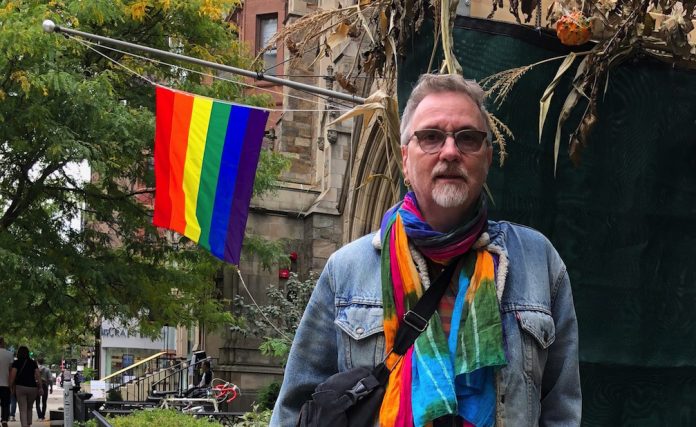[This story appears in the current November/December 2018 issue of Boston Spirit magazine. Subscribe for free today.]
Every one of us is just a hip fracture away from losing our independence. This is a vision of the future that no one wants to imagine. It’s hard to comprehend that overnight you would need to rely on someone else to cook, clean or bathe you. But it is inconceivable to imagine that in 2018 the person being sent to care for you might be homophobic or intolerant if they found out you were LGBT.
Like most people, Kurt Cybulski never imagined he would need care providers. Cybulski was a young gay man living in Boston and working as graphic designer. On his 39th birthday, just as he was dreading turning 40, he had a brain aneurism that left him completely paralyzed on his left side. Cybulski spent the next three months at New England Rehab until he could learn to sit up, feed, swallow and use a wheelchair. Despite needing to wear a bike helmet at all times, Cybulski was released into his parents’ care.
After several years Cybulski yearned to be on his own again. He moved back into his apartment, but because he could only stand for limited amounts of time, he soon found it very difficult to clean, do laundry or cook anything. He existed on sandwiches and his apartment fell into utter disrepair. Eventually the demands of daily life became too much for someone with this kind of paralysis and Cybulski applied for home care through Mass Rehab.
Although Cybulski was never able to return to work he managed to get by at home for many years thanks to the services he was receiving from Mass Rehab. Unfortunately, his eligibility for those services ended when he turned 60 and he was transitioned to a local elder service provider for home care.
A Jamaican woman was sent to Cybulski’s home and began to do his cleaning and laundry. The two developed a wonderful relationship and she did things that went above and beyond her role as a cleaner. She would often say, “This is my job to care for you, so you just sit back and let me help you.” They would talk and laugh as she cleaned. Because Cybulski went to church regularly he wasn’t bothered that her favorite things to talk about were the miracles that Jesus brought into her life.
Everything changed one day when the cleaner was dusting a bookshelf and picked up a framed photo of naked men wrestling that Cybulski’s friend had bought for him in Provincetown. Her tone changed and she even looked at him differently. She started saying things under her breath and when Cybulski asked her to speak up she told him that God hates gays. Cybulski was horrified as she went on to say even crueler things. The following week she told him that people with AIDS were evil and the disease was punishment from God for their sins. That was the final straw, Cybulski had lost a number of dear friends to AIDS and hearing this was unbearable.
Cybulski felt that he was being violated in his own home and was ≠≠left feeling alone and attacked. He reached out to the cleaner’s boss, shared what happened, and was told if he didn’t want her to say these things he would have to tell her himself.
The following week Cybulski mustered up every bit of courage and confronted his cleaner. He said he had been through a lot of challenges in his life and that his home was his only safe and happy place. He would not tolerate hearing these things in his own home.
For several weeks after that confrontation the cleaner came, but did not utter a word to Cybulski. She cleaned in silence and left the apartment. Eventually she said it was too difficult to park in that area and she would no longer be returning. After this, Cybulski went through a string of unsuccessful cleaners and has now discontinued his contract with that elder service provider. He is currently in the process of seeking a private company, which is going to cost him considerably more money than the state subsidized services. The bottom line for Cybulski: he wants to feel safe in his own home.
Kurt Cybulski’s story underscores the urgency in having home care providers who are trained in LGBT cultural competency. This is the heart of a new bill that was recently signed into law on July 26, 2018 by Governor Charlie Baker. It is landmark legislation that marks Massachusetts once again as the first and only state in the nation with such a law. But it wasn’t easy. This is legislation that has been in the making for nearly 10 years. This bill was finally signed into law this year thanks to backing from the Massachusetts Commission on LGBT Aging that made the bill a priority along with invaluable support from legislators like Rep Sarah Peake (D, Barnstable), Rep Liz Malia, (D, Jamaica Plain), the bill’s co-sponsor, and House Ways and Means Chair, Rep Jeffrey Sanchez (D, Jamaica Plain).
The bill requires the Massachusetts Executive Office of Elder Affairs (EOEA) to develop a training program that will eliminate discrimination based on sexual orientation and gender identity and expression and will improve access to aging services for lesbian, gay, bisexual and transgender elders and caregivers. This training will be mandated for all agencies who receive funding or certification from EOEA, which includes all aging service access points, nursing homes, assisted living facilities and state-funded home care providers. Although people may not remember July 26, 2018 as a landmark date like May 17, 2004, the day gay marriage was legal in Massachusetts, it will be a law that will mean a great deal to hundreds of our LGBT elders who will be able to receive safe, competent care in their own homes.
Bob Linscott is assistant director of the LGBT Aging Project at Fenway Health.









